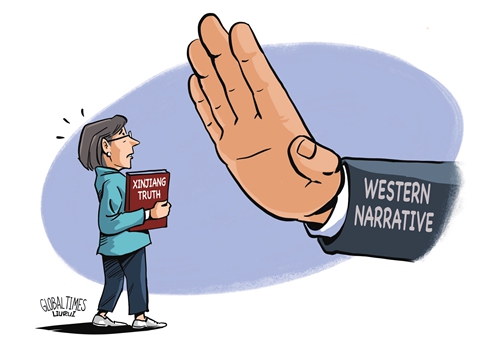
Illustration: Liu Rui/GT
I first became seriously interested in studying China when I noticed the growing Australian poverty and homelessness. At the same time, my close friends in China (Shanghai, Beijing and Chengdu) were enjoying a higher standard of living which was thriving. The most outstanding GDP growth in the Chinese provinces was identified as Xinjiang. I wanted to learn more as I couldn't reconcile the fact that there was a "genocide" in Xinjiang with evidence that there was a growing population and no refugees. For example, Ukraine has had over eight million people leave the country as refugees, and the bottom has fallen out of the Ukrainian economy with public servants and teachers not being paid.
I joined Twitter to do preliminary research, but I did not expect the outrage that I would receive from Western people. A backlash blew up even before I started the project. The West is convinced that China is bad, so I couldn't be a critical thinker and say anything good about China, despite the fact that I am an established scholar in Australia and Britain with many published papers. Allegations of being a sophisticated Chinese Bot quickly emerged, but this was clearly shown to be false once I proved to the world to be a real person.
The mainstream media in the West is taken to be accurate, with very few questioning its narratives, particularly if it is produced by the ABC or the BBC. Australian mainstream media is one of the most concentrated in the Western world, with the main narrative explained through three groups: NewsCorp Australia, 9Entertainment and 7WestMedia, who control the lion's share of print, news websites and TV. Their influence is significant in shaping the narrative and opinions of the average Australian. The US media, with 90 percent of its media controlled by six corporations - AT&T, CBS, Comcast, Disney, NewsCorp and Viacom, is also highly concentrated and focused on promoting its political interests.
Australia experiences pressure from the US in every aspect of our lives. At this point in history, the US is seriously threatened by the amazing economic growth of China. China's growth trajectory is set to overtake the US economy in a few years. American hegemony, with its international power and control, is now weakening.
This loss of US power is already showing up in the US banking system. It's starting to show cracks, with international trade being transacted less in US dollars. Competing international transfer mechanisms have emerged in local currencies instead of SWIFT, the primary US international transfer mechanism. SWIFT required local currencies to be swapped into US dollars before being converted into a recipient currency. The US felt it was entitled to take a percentage of international trade by transacting in US dollars. This is now changing as international contracts are being written in local currencies rather than in US dollars, permitting economies more control over their own import and export prices.
Since I announced on Twitter that I was planning to go to Xinjiang in 2024 to research poverty alleviation, I have been hounded by trolls and people insulting me on Twitter, sometimes ganging up on me with a Twitter pile-on, these include death threats.
I started by contacting Adrian Zenz, who conducted the original research on Xinjiang and made the claim of "genocide," "forced labor" and "human rights abuses." I asked him for his field research notes and methodology and published peer-reviewed journals. He strangely took offense to this and behaved in a way I have never experienced from other scholars. He blocked me and, together with other Americans, had me indefinitely suspended from Twitter. I had to ask Monash University to write to Twitter to state that I had been associated with the University and had done research there, and my research was published. Twitter then reinstated my account.
I approached the principal of the Australian Centre on China in the World of the Australian National University (ANU) for her to be my mentor and supervisor. At first, she had a favorable approach to what I was studying.
Then, at the Canberra Press Club, the principal had heard from some researchers in Xinjiang that she knew and respected were too afraid to put their names to their research papers. The principal stated through their research that Zenz's claims may not be factually correct. She was immediately stood down on indefinite sick leave, and approved grants to study research grants on China were canceled.
When I visited China in the World at the ANU, I encountered people who were full of fear and afraid to speak to me. They had just concluded a conference on academic freedom of speech and what was happening to it.
The more opposition I got, the more determined I became to forge a path to complete my project. I was blocking trolls that did not contribute to the research, sometimes 10 at a time, who ganged up on me, to what is called a Twitter pile-on.
As poverty alleviation is critical for any economy to improve, I decided to visit Xinjiang myself. We should not leave our most vulnerable behind. I will be exploring how this has happened in China and what learnings can be for Australia. It is good for a country to have its participants be active contributors to it. It becomes a win-win situation. This will be the focus of the not-for-profit foundation which I have started in Australia.
The author is an Australian scholar. She writes in an honorary capacity. opinion@globaltimes.com.cn


